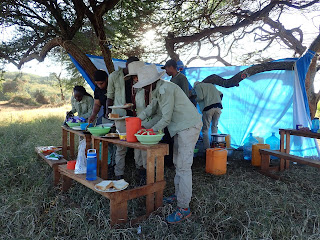Trees have dramatically disappeared from the Maasai Marra with the change in climate and the increase of goat herds. The Kili Initiative has been dedicated to fighting this deterioration of the by promoting the planting of trees around schools by the students and Kili Initiative team members.
We rose early and washed with the small bowl of water. I cleaned my face, hands, and private parts. I thought about changing my clothing, but Larry had been wearing the same outfit since our departure. Strangely neither of us thought we smelled bad.
At dawn the team and I performed our morning calisthenics. Ma’we and I remained behind in camp, as the rest of them went on a jog.
Afterwards we ate breakfast.
Eggs, sausages, ugali, and Africafe, the best instant coffee on Earth.
Vanessa, Ubah, Maureen, Nathalia, and Laikyn sat away from us and I rethought my cleanliness, however our next shower was two days away in Loitokitok.
After the dishes were washed, JM assembled us and handed out baby trees.
“We have planted trees here, but the school has no fence. The goats eat the small trees. They eat everything green, but the people love goats. They love the meat and love the milk. We are going to the next village. It is not far.”
“Nothing is far in Africa as long as you have your feet,” said Jackman, a young man happy to only carry water and two seedlings.
“We’ll see.” I had calculated that we had walked approximately eighty miles since leaving Loitokitok and the 2019 Kili Initiative set out for our destination.
The topsoil was drying to dust.
Erosion was destroying the land.
“People cut down trees. They think they can live the old ways,” explained JM to the young team members. Dust trailed behind him. “The Kili Initiative tries to show them other way, but it’s slow going.”
“Yes, a problem is like a beer belly. It did not get there in one day and will not go away in one day,” I said and patted Ma’we’s ample stomach.
Gullies were chasms.
Young people carrying plastic jugs and buckets to a small stream.
The muddy current was their main source of water.
“It is this or nothing,” said Vanessa. She came from Kibera, a giant slum. The government did nothing to provide clean water to the hundreds of thousands of people in ‘The Forest’. “And this is better than Nairobi.”
“Much better,” said young Steve.
Nathalia and Vanessa crossed the creek with the help of Fast Steve.
The land became fertile on the other side. Water from the stream irrigated the fields. Life was good on this side. We saw a car for the first time in days. Still there was only one way to help the land recover and that was being kind to it and sharing its wealth.
And planting trees was one of the ways.
Banda likikushinda, jenga kibanda, an old Swahili saying, which means ‘If you can’t build a hut, build a shack.’
But Ma’we and I could always build a beer belly.

















